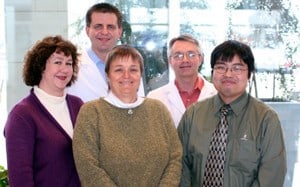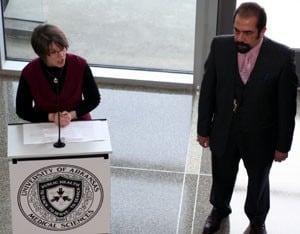UAMS Faculty Earn Clinical/Translational Research Awards
Feb. 23, 2010 | The ripple effect from last summer’s largest-ever research grant earned by the University of Arkansas for Medical Sciences (UAMS) has reached 17 faculty members dedicated to clinical and translational research. The UAMS Center for Clinical and Translational Research (CCTR) recently awarded more than $1.1 million to faculty dedicated to pursuing clinical and translational research in two separate programs. The CCTR Pilot Study program awarded more than $973,000 to 15 investigators across nine UAMS departments, while the KL2 Mentored Clinical Research Scholar program will provide nearly $200,000 of support for two winners. The UAMS CCTR is one of 46 medical research institutions working together as a national consortium to improve the way biomedical research is conducted across the country. The consortium, funded through Clinical and Translational Science Awards (CTSA), shares a common vision to reduce the time it takes for laboratory discoveries to become treatments for patients, and to engage communities in clinical research efforts. It also is fulfilling the critical need to train a new generation of clinical researchers. The CTSA program is led by the National Center for Research Resources (NCRR), part of National Institutes of Health (NIH). “We are pleased to have these awards programs up and running and funding some of our brightest minds and innovative ideas here at UAMS,” said Curtis Lowery, M.D., director of the UAMS CCTR. “We are one of the few CTSA institutions in the country able to get these programs up and running so quickly, and we look forward to streamlining the process and expanding these opportunities in the future.” Pilot Study Program The studies were reviewed with four things in mind, including innovative and translational potential; potential to quickly impact human health; alignment with the goals of the CCTR; and the potential to lead to extramural research funding and establish research programs. The 15 Pilot Study awardees are: KL2 Career Development Awards The awards provide financial support for both winners totaling nearly $200,000 that affords the winners two years of protected time to develop a research program and receive appropriate mentoring and training. “If you think about what the goal of the CTSA is, which is basically to help develop and foster the infrastructure to bring groundbreaking research from bench to bedside and bedside to community quicker and more efficiently, the KL2 Award is a critical component of this,” said Robert McGehee Jr., Ph.D., dean of the UAMS Graduate School and co-director of the CCTR’s Office of Research Education, Training and Career Development. “Having the full support of their home departments coupled with strong mentorship from successful and established clinical and translational scientists plays a key role in helping these awardees develop their innovative research and independence,” McGehee said. “Both Drs. Felix and Cheung have outstanding mentorship and already have had abstracts accepted for presentation this spring at the 2010 Clinical and Translational Research and Education Meeting in Washington DC, the second annual joint meeting of the Association for Clinical Research Training and the Society for Clinical and Translational Science.” Cheung said his research is focused on understanding the progression and pathogenesis of melanoma. “To do this, I am looking for proteomic and epigenetic changes that occur in melanoma cells and various other melanocytic lesions,” Cheung said. “Eventually we will determine if these changes play a role in the pathogenesis of melanoma. This award will play a big role in giving me the time and support needed to accomplish this. In addition, this award will help me obtain future funding to be an independent clinician scientist.” Felix said the award will help launch a career as an independent investigator. She plans to focus her research on the effect of obesity on the long-term care system, with the hope that her research will improve access to and the quality of long-term care services. “Our state is considered a leader on childhood obesity and I’d like to extend that into investigating the rising rates of obesity among both the pre-elderly and elderly populations and what the effects are on long-term care,” Felix said. “This award will allow me to focus the time and effort needed to get advanced training, collect data and to further explore this topic.” McGehee said the CCTR’s goal is to have two awardees per year, with five to six junior faculty members going through the program at a time. |



